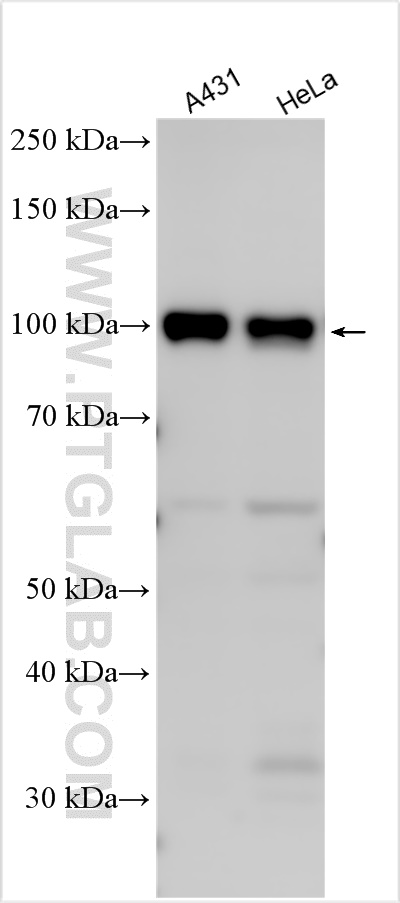验证数据展示
经过测试的应用
| Positive WB detected in | A431 cells, HeLa cells |
推荐稀释比
| 应用 | 推荐稀释比 |
|---|---|
| Western Blot (WB) | WB : 1:500-1:3000 |
| It is recommended that this reagent should be titrated in each testing system to obtain optimal results. | |
| Sample-dependent, Check data in validation data gallery. | |
产品信息
25095-1-AP targets IGFN1 in WB, ELISA applications and shows reactivity with human samples.
| 经测试应用 | WB, ELISA Application Description |
| 经测试反应性 | human |
| 免疫原 | IGFN1 fusion protein Ag18731 种属同源性预测 |
| 宿主/亚型 | Rabbit / IgG |
| 抗体类别 | Polyclonal |
| 产品类型 | Antibody |
| 全称 | immunoglobulin-like and fibronectin type III domain containing 1 |
| 别名 | KYIP1, EEF1A2BP1 |
| 计算分子量 | 1251 aa, 138 kDa |
| 观测分子量 | 100 kDa |
| GenBank蛋白编号 | BC131529 |
| 基因名称 | IGFN1 |
| Gene ID (NCBI) | 91156 |
| RRID | AB_3669462 |
| 偶联类型 | Unconjugated |
| 形式 | Liquid |
| 纯化方式 | Antigen affinity purification |
| UNIPROT ID | Q86VF2 |
| 储存缓冲液 | PBS with 0.02% sodium azide and 50% glycerol, pH 7.3. |
| 储存条件 | Store at -20°C. Stable for one year after shipment. Aliquoting is unnecessary for -20oC storage. |
背景介绍
Immunoglobulin-like and fibronectin type III domain-containing protein 1 (IGFN1), also known as EEF1A2-binding protein 1 (EEF1A2BP1) or KY-interacting protein 1 (KYIP1), presents structural similarity to sarcomeric proteins belonging to the intracellular Ig superfamily, including myosin-binding protein C fast and slow-type skeletal muscle isoforms (PMID: 18756455). IGFN1 along with KY and FLNC is the part of a Z-band associated protein complex likely providing structural support to the skeletal muscle (PMID: 20206623). IGFN1 gene has been associated with some cancers (PMID: 28027327; 30335789; 35456975). At least five isoforms of IGFN1 produced by alternative splicing have been identified (PMID: 20206623).
实验方案
| Product Specific Protocols | |
|---|---|
| WB protocol for IGFN1 antibody 25095-1-AP | Download protocol |
| Standard Protocols | |
|---|---|
| Click here to view our Standard Protocols |
